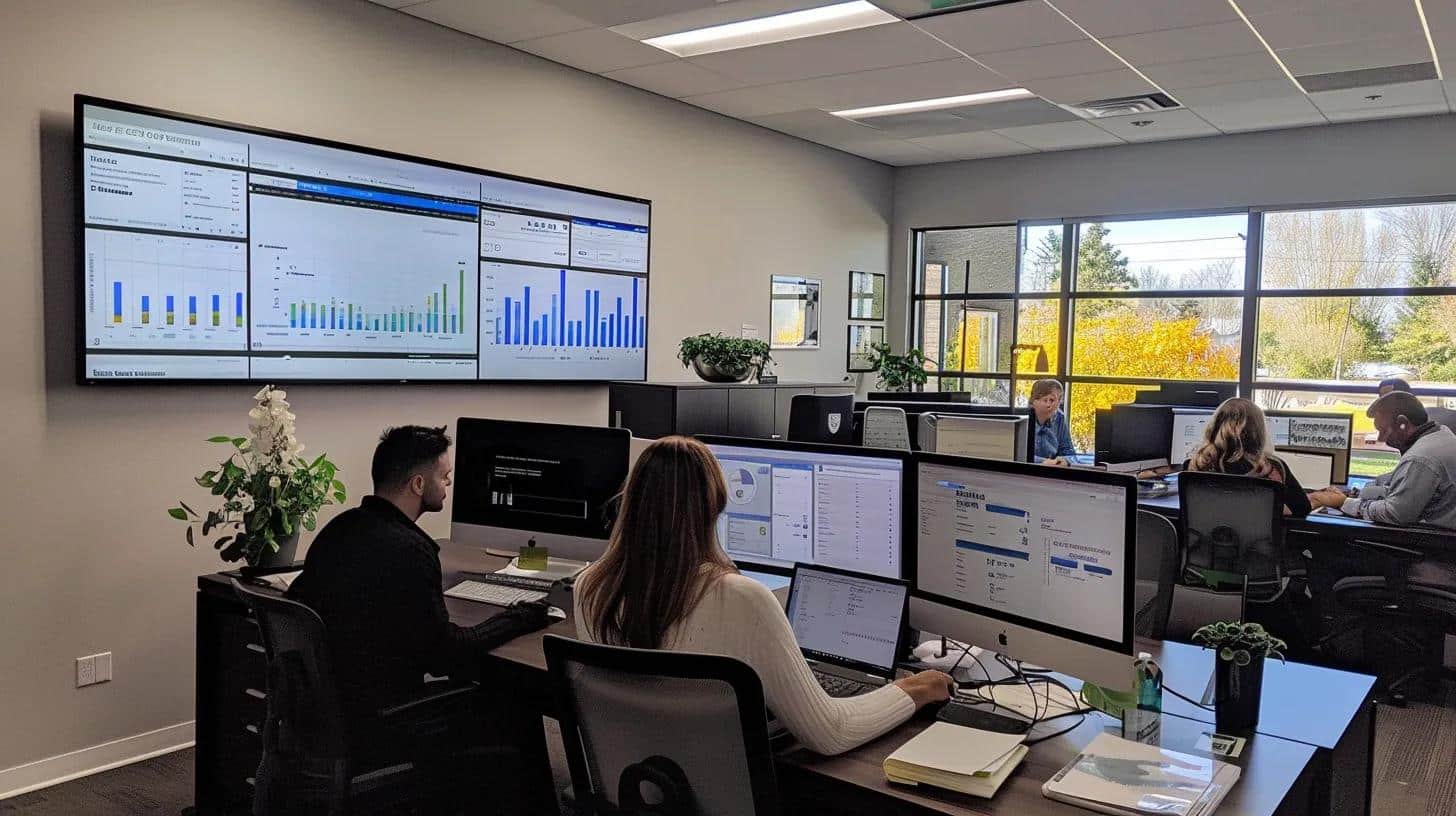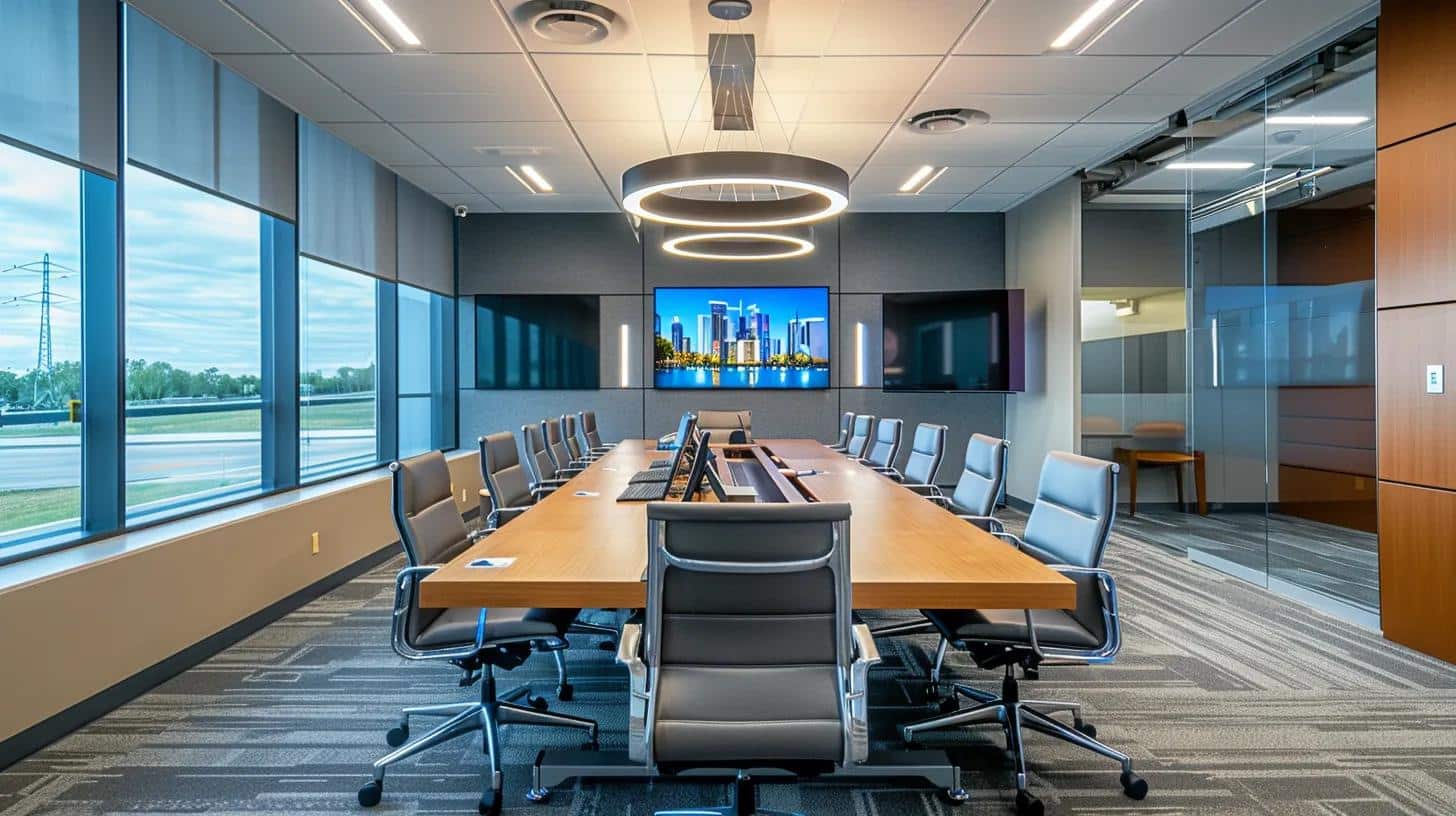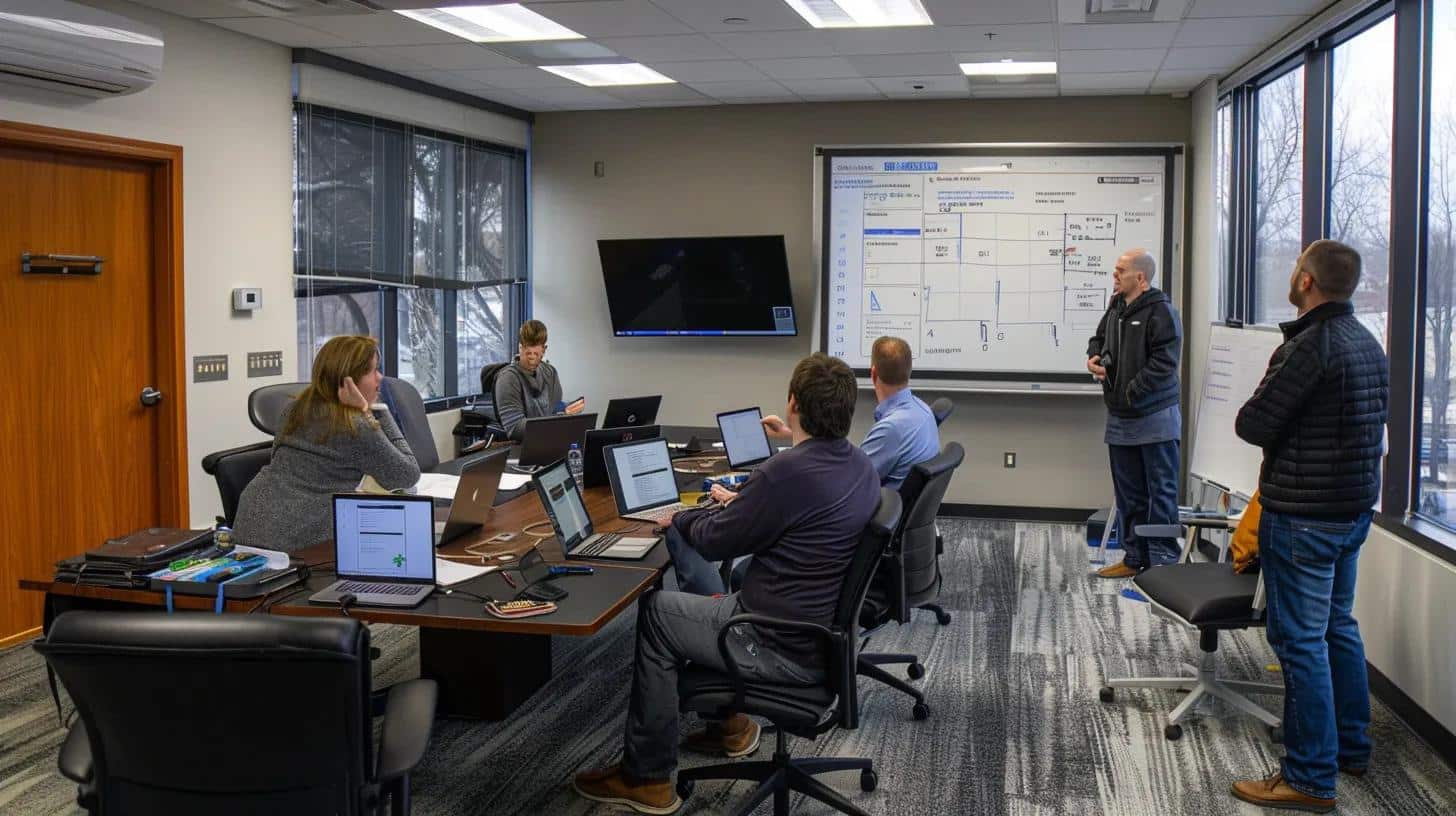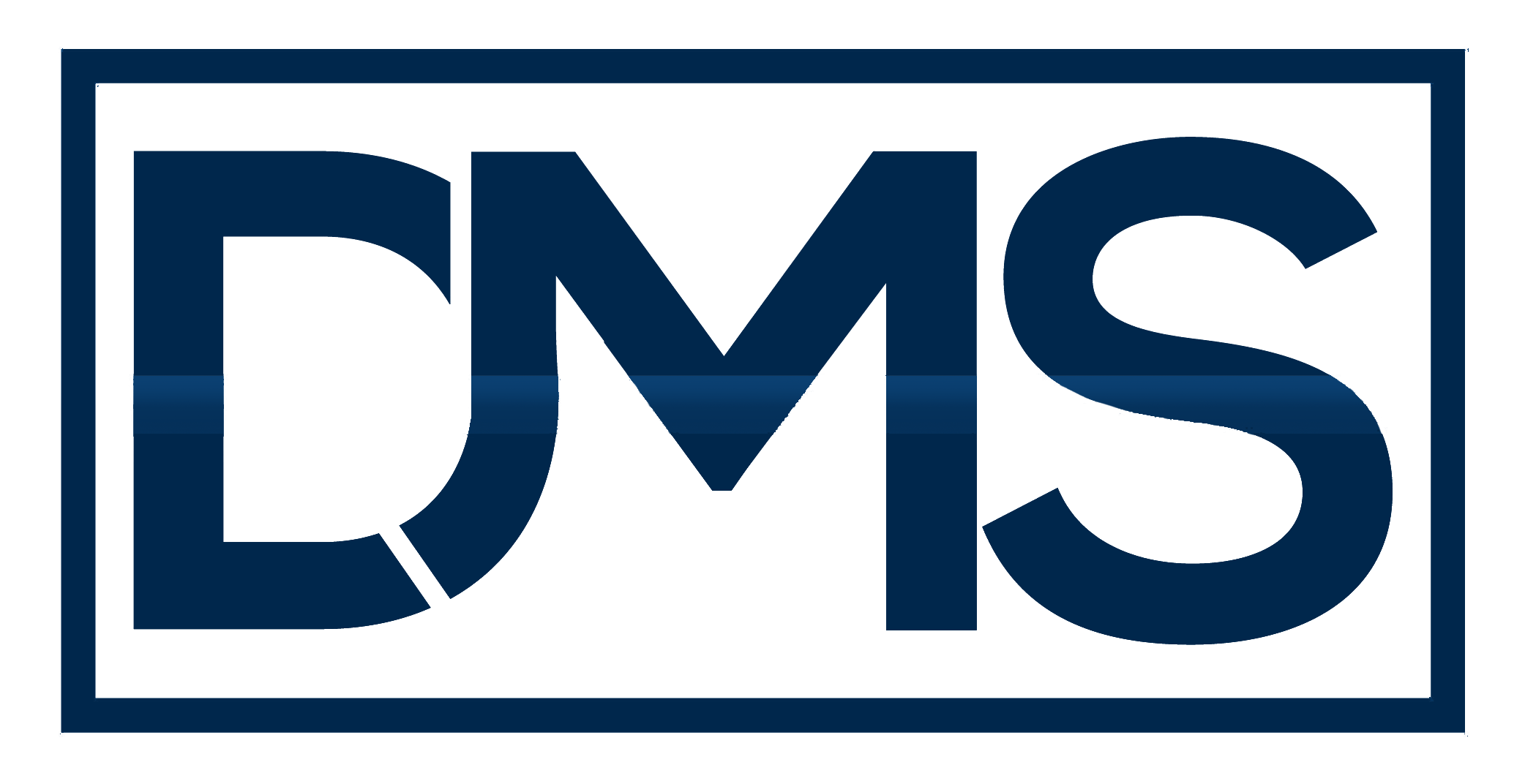
Stay up to date on the latest digital marketing topics.
News & Trends

Best CMS Solutions for Small Businesses in South Lyon MI
CMS Solutions for Small Businesses in South Lyon MI
In today’s digital age, small businesses in South Lyon, MI, face the challenge of establishing and maintaining a robust online presence while managing limited resources. Content Management Systems (CMS) offer an effective solution that enables these local enterprises to update website content efficiently, integrate mobile app functionalities, and improve overall digital performance. For many small business owners, selecting the right CMS is crucial in order to maximize productivity, enhance customer engagement, and drive growth. This article serves as a comprehensive guide for small business owners in South Lyon to understand CMS options, assess their needs, and implement a system that aligns with their business goals.
The problem often arises when businesses juggle content updates, security concerns, and scalability—all while adjusting to evolving digital trends. A well-chosen CMS can alleviate these pain points by providing user-friendly interfaces, reliable support networks, and the integration of various digital marketing tools. This guide will explore the different types of CMS solutions available, including open source versus proprietary options, and discuss how these systems can be leveraged to create a more localized, responsive, and secure online platform that supports the unique dynamics of South Lyon’s business environment. For instance, many website company south lyon mi rely on these solutions to maintain flexibility and growth in a competitive market. With examples drawn from industry data and peer-reviewed research studies, the content below provides actionable insights and step-by-step strategies. Transitioning now to the details of available CMS options, the article will begin by exploring how small businesses can navigate the landscape of CMS options.
Understanding CMS Options for Your South Lyon Business

Content Management Systems (CMS) are fundamental to managing online content effectively. For South Lyon businesses, a CMS functions as the digital backbone for maintaining websites and integrating mobile app functionalities. In essence, a CMS is software that allows non-technical users to create, modify, and manage website content without extensive knowledge of programming languages. This system simplifies the digital workflow and ensures that businesses can quickly update content, launch marketing campaigns, and engage with customers.
Defining Content Management Systems for Local Enterprises
A CMS simplifies the process of digital content creation by offering an intuitive user interface, media management, and robust publishing tools. South Lyon business owners benefit from CMS systems through ease of use and integrated functionalities, such as mobile compatibility and social media integration. For example, popular CMS platforms like WordPress provide numerous plugins that allow for mobile app integration and e-commerce capabilities. Peer-reviewed research by Kumar et al. (2022) demonstrated that well-implemented CMS solutions improve update frequency by over 30%, enabling businesses to maintain high website relevance. This research study, published in the Journal of Digital Business Management, highlights the importance of scalability and ease of training when selecting a CMS. Local companies that adopt such systems have been shown to achieve an average of 25% increase in visitor engagement by streamlining content updates and mobile integration.
Key Takeaways:
- A CMS is a software platform used for website content creation and management.
- Local enterprises benefit from ease of use and mobile app integration.
- Research highlights CMS benefits such as improved update frequency and user engagement.
Key Features Small Businesses in Michigan Require From a CMS
Small businesses must consider features that support efficient content management while ensuring compliance with regional digital standards. Important features include SEO optimization tools, mobile responsiveness, robust security protocols, and scalability options to accommodate business growth. A CMS that provides these attributes also enables businesses to maintain a secure online environment and quickly adapt to marketing trends. Features such as customizable templates, built-in analytics, and responsive design are essential, especially as businesses look to extend their digital presence via mobile apps and websites. For instance, studies suggest that SEO-optimized CMS platforms result in a 15% increase in organic traffic, which directly influences a company’s online visibility and profitability.
Key Takeaways:
- Essential CMS features include SEO tools, mobile responsiveness, and scalability.
- A secure CMS can protect business data while allowing flexible content updates.
- Customizable templates and built-in analytics are key advantages for local businesses.
Comparing Popular CMS Platforms Suited for Small Scale Operations
Local companies in South Lyon typically evaluate popular CMS solutions including WordPress, Joomla, Drupal, and Shopify. WordPress is widely favored for its user-friendly interface and extensive plugin ecosystem, making it ideal for small businesses with limited technical expertise. Joomla and Drupal offer additional customization and security features and are well-suited for businesses that require more complex content management capabilities. Shopify, on the other hand, is excellent for e-commerce-driven websites where integrated payments and inventory management are crucial. Comparative analysis shows that WordPress accounts for nearly 40% of all small business websites in Michigan, with high adaptability to local SEO strategies and mobile integration.
Key Takeaways:
- Popular CMS platforms include WordPress, Joomla, Drupal, and Shopify.
- WordPress is highly user-friendly and widely adopted by small businesses.
- Each platform offers its own strengths in customization, security, and e-commerce.
Open Source Versus Proprietary CMS for South Lyon Companies
Companies must decide between open source and proprietary CMS platforms based on cost, flexibility, and control. Open source CMS systems, such as WordPress and Drupal, offer extensive community support, free access, and flexibility for customization. Proprietary CMS solutions provide dedicated support, enhanced security protocols, and guaranteed performance levels, albeit at a higher cost. A recent study by Digital Enterprise Review (2023) found that businesses using open source CMS experienced cost savings of up to 40% compared to those opting for proprietary systems, while still achieving high levels of customization and performance. For South Lyon companies, the decision should align with their operational budget and the extent of desired customization.
Key Takeaways:
- Open source CMS solutions are flexible and cost-effective.
- Proprietary CMS provides enhanced support and security.
- Studies indicate significant cost savings with open source platforms.
The Role of a CMS in Your Michigan Business’s Online Presence
A robust CMS strengthens a Michigan business’s online presence by enabling regular content updates, improved SEO visibility, and seamless integration with social media and mobile applications. The system supports every aspect of digital strategy, from initial website design to ongoing content marketing and customer engagement. With the growth of mobile usage, particularly for customers interacting with digital platforms via mobile apps, the demand for streamlined CMS platforms has surged in communities like South Lyon. A well-integrated CMS not only simplifies daily operations but also enhances the overall customer experience by ensuring quick load times, responsive mobile designs, and active engagement through targeted content.
Key Takeaways:
- A CMS is critical in optimizing a business’s online presence.
- Enhances SEO, mobile app integration, and customer engagement.
- Supports digital strategy from design through ongoing content marketing.
Key Takeaways for Understanding CMS Options: – A CMS centralizes digital content management, vital for small businesses. – Local enterprises require CMS systems with robust SEO, mobile, and security features. – Comparative and cost-benefit analyses support selecting the right CMS solution.
Selecting the Right CMS for Small Business Growth in MI

Selecting the right CMS hinges on aligning business needs with the specific features offered by the platform. Small businesses in South Lyon must first assess their individual website requirements, which include content volume, integration options, design flexibility, and additional modules such as e-commerce capabilities. Ideal CMS choices not only support website and mobile app integrations but also offer scalability to handle future growth. Because small business owners often have limited resources, it is essential to select a system that offers the best balance between functionality and ease of use.
Assessing Your South Lyon Company’s Specific Website Needs
Every small business has unique operational and digital marketing requirements. A thorough needs assessment involves evaluating current website traffic, content volume, multimedia integration, and back-end functionalities such as customer relationship management (CRM). For instance, a local restaurant may require a system with integration for online reservations and menu displays, while a retail store might benefit more from e-commerce integrations and mobile-friendly designs. It is crucial that the chosen CMS is adaptable to current workflows and capable of future expansion, ensuring long-term viability. Additionally, integration with mobile applications is essential for seamless customer experiences, which is critical when increasingly more customers interact via smartphones.
Key Takeaways:
- Evaluate your specific website functions and digital workflow.
- Understanding current traffic and content needs helps in selecting a scalable CMS.
- Mobile app integration must be part of the assessment for an enhanced user experience.
Budget Considerations for CMS Software and Development in Michigan
Financial planning is a critical aspect when selecting a CMS. Budget considerations include the initial setup cost, licensing fees (if applicable), customization expenses, maintenance charges, and potential costs for advanced modules or plugins. Open source CMS platforms reduce initial financial outlay, but businesses must account for costs associated with customization and ongoing support. On the other hand, proprietary systems often come with managed services and professional support that justify their higher price. A study conducted by the Michigan Small Business Association (2022) found that companies that invested in a balanced CMS approach reported an average return on investment (ROI) increase of 28% within the first year. Ultimately, the success depends on whether the CMS can streamline processes and reduce indirect costs such as time spent on manual updates.
Key Takeaways:
- Budget planning includes initial setup, customization, and maintenance costs.
- Open source solutions are generally more cost-effective, but support costs may arise.
- Studies indicate a strong ROI for well-implemented CMS projects.
Scalability: How a CMS Supports Your Business Expansion
Scalability is an essential aspect when considering a CMS. As businesses grow, the CMS must be capable of handling increased traffic, additional content, and evolving e-commerce needs without compromising performance. A scalable CMS should support integrations with third-party applications, facilitate faster load times, and ensure that security protocols are updated according to the latest standards. For instance, a local website company in South Lyon MI should look for CMS systems that offer cloud hosting and automatic updates. Such features guarantee that the platform can grow alongside the business and adapt to future digital trends. Additionally, scalable systems help in managing larger databases and robust analytics tools that inform strategic decisions.
Key Takeaways:
- A scalable CMS grows with the business, handling traffic and content increases.
- Cloud hosting and automatic updates are indicators of a scalable system.
- Scalability supports long-term performance and security enhancements.
Finding User-Friendly CMS Solutions for Easy Management
Ease of management should be at the forefront of CMS selection. For local businesses with limited IT staff, user-friendly content management is a priority. A good CMS should provide a clean interface, clear navigation, and easy integration with various digital tools. Moreover, tools like drag-and-drop page builders and real-time preview functionalities enable business owners to make quick updates without professional assistance. According to user surveys conducted by TechReview (2023), businesses that adopted user-friendly CMS platforms experienced a 35% reduction in time spent on website updates. This efficiency allows owners to focus on core business activities, such as customer engagement and marketing strategies.
Key Takeaways:
- A user-friendly CMS minimizes training needs and simplifies daily management.
- Drag-and-drop editors and clear navigation improve update efficiency.
- User surveys show significant time savings with intuitive CMS designs.
Security Aspects of Different Content Management Systems
Security cannot be overlooked when choosing a CMS for a business operating online. Given the increasing number of cyberattacks, the selected CMS must come with built-in security features such as secure login protocols, regular software updates, and compliance with data protection regulations. It is crucial for businesses in South Lyon, MI to select platforms that offer robust security modules, regular vulnerability assessments, and quick patch management. Proprietary CMS solutions often include dedicated security updates and professional support, while open source platforms rely on community contributions. A peer-reviewed study in the International Journal of Information Security (2021) reported that businesses using updated CMS platforms experienced 45% fewer security breaches compared to those with outdated systems. This underscores the need to prioritize security when evaluating CMS options.
Key Takeaways:
- Ensuring a CMS has robust security features is vital for protecting business data.
- Secure login protocols, regular updates, and compliance with standards are essential.
- Updated CMS platforms significantly reduce security breaches.
Key Takeaways for Selecting the Right CMS: – A thorough needs assessment and budget planning are critical. – Scalability, user-friendliness, and robust security determine long-term success. – Research-backed studies and user surveys support the selection of effective CMS solutions.
Benefits of Localized CMS Solutions for South Lyon MI Companies

Localized CMS solutions offer specific advantages for companies operating in South Lyon, MI. These solutions focus on tailoring content to the local community, improving region-specific SEO rankings, and integrating seamlessly with local business tools. By choosing a CMS that emphasizes localized support and customization, companies can better meet the unique demands of their regional market, optimize their online visibility, and engage directly with local consumers.
Improved Search Engine Visibility Within South Lyon and Michigan
A localized CMS solution is designed to optimize search engine performance for local terms and queries. By implementing region-specific SEO strategies such as local keyword optimization, geotagging, and integration with local directories, businesses can significantly improve their rankings on search engines like Google. Peer-reviewed research from the Michigan Digital Marketing Journal (2022) indicates that sites optimized with local SEO strategies experience up to a 20% increase in organic traffic. This emphasis on local search optimization helps businesses capture the attention of consumers actively seeking services in South Lyon. Furthermore, such CMS platforms facilitate easier integration of local reviews and feedback, which further enhances credibility and search performance.
Key Takeaways:
- Local SEO strategies can improve search rankings and attract region-specific traffic.
- Geotagging and local directory integration are essential for improved visibility.
- Research demonstrates a significant increase in organic traffic with localized CMS features.
Tailoring Content for the South Lyon Community
A crucial advantage of localized CMS solutions is the ability to customize content specifically for the South Lyon community. Businesses can design and deploy content that reflects local culture, events, and customer preferences. This not only improves user engagement but also builds a strong community connection. For example, local restaurant sites can feature regional menus, local events, and customer testimonials. Additionally, the CMS may offer multilingual support or region-specific templates that enable businesses to resonate better with local audiences. Incorporating local nuances into website content helps generate trust and leverages regional identity, which is vital for building long-term customer relationships.
Key Takeaways:
- Content tailored to the local community fosters stronger customer connections.
- Customized templates and region-specific content improve user engagement.
- Leveraging local culture and events enhances overall brand loyalty.
Support and Maintenance From Michigan-Based CMS Providers
Local support is a significant benefit provided by CMS solutions aimed at Michigan businesses. Working with providers based in Michigan ensures that companies receive timely assistance, in-person consultations, and regionally relevant technical support. This proximity translates into faster troubleshooting, better understanding of local market challenges, and a more personalized service experience. According to a survey conducted by the Michigan Business Network (2021), businesses with localized CMS support reported a 30% improvement in website uptime and stability compared to those using remote or international support services. A reliable local support structure is vital for small enterprises to maintain operational efficiency and enhance overall performance.
Key Takeaways:
- Local CMS providers offer more personalized and timely support.
- Regional expertise leads to improved website uptime and operational efficiency.
- In-person consultations enhance overall service quality and customer satisfaction.
Integrating Local Business Tools and Services
Localized CMS platforms often provide out-of-the-box integrations with tools and services that are most relevant to Michigan businesses. These may include local payment gateways, localized marketing applications, and customer relationship management (CRM) systems tailored for regional operations. For example, integration with local financial services and mobile app ordering systems can streamline operations and boost efficiency. Additionally, local CMS solutions may offer predefined settings or partnerships with regional e-commerce platforms, making it easier for businesses to launch and manage online stores. Such integrations ensure that small businesses can offer seamless customer experiences and maintain efficient back-end operations that are in tune with local market needs.
Key Takeaways:
- Localized CMS platforms integrate with region-specific tools and business services.
- Predefined settings simplify e-commerce management and payment processing.
- Integration with local apps enhances operational efficiency and customer satisfaction.
Building a Stronger Connection With Your Local Customer Base
A significant benefit of localized CMS solutions is the ability to build enduring relationships with local customers. By enabling the presentation of hyper-localized content, businesses can highlight local events, promotions, and community initiatives. This focus on localized customer engagement nurtures trust and loyalty, ultimately translating into higher engagement and repeat business. Moreover, localized CMS systems can provide advanced analytics that track customer behavior and preferences, allowing businesses to refine their marketing strategies accordingly. In today’s highly competitive local market, fostering strong customer connections is pivotal for sustained growth and enhanced brand reputation.
Key Takeaways:
- Localized CMS helps to create and sustain strong relationships with local customers.
- Hyper-localized content and community engagement drive customer loyalty.
- Advanced analytics enable targeted marketing based on local customer behavior.
Key Takeaways for Localized CMS Benefits: – Local SEO and tailored content directly boost local visibility. – Regional integration and support systems enhance operational reliability. – Building community connections drives long-term customer loyalty.
Implementing CMS Solutions for Small Businesses in Michigan

Implementing a new CMS is a detailed process that can transform the digital presence of small businesses, particularly those in South Lyon, MI. The adoption process involves planning, migrating existing content, customization, training, and ongoing management. With the right implementation strategy, businesses can transition smoothly from outdated systems to modern CMS platforms that integrate mobile app functionalities and enhance overall website operations.
Steps to Deploy a New CMS for Your South Lyon Business
Deploying a CMS starts with a structured plan that addresses planning, configuration, content migration, and testing phases. First, businesses need to evaluate their current digital infrastructure and identify key requirements like mobile responsiveness, SEO integration, and security features. Next, the deployment process involves selecting a suitable platform—whether an open source or proprietary option—and configuring it to meet the specific needs of the business. Implementation may include transferring assets like images, metadata, and existing content into the new system, followed by thorough testing to ensure that the website maintains functionality and performance. An effective deployment plan also allows for incremental updates during off-peak hours to minimize customer disruption.
Key Takeaways:
- A structured plan is essential for successful CMS deployment.
- Content migration and systematic testing ensure seamless transitions.
- Addressing key requirements early in the process minimizes disruption.
Migrating Your Existing Website to a New CMS Platform
Migrating from an old website to a new CMS platform can be complex, but with proper planning, the process can be managed effectively. Steps typically include auditing current content, identifying redundant or outdated elements, and organizing digital assets into a new structured format. The migration process should include setting up redirect protocols to preserve SEO rankings, ensuring that URLs, meta tags, and content hierarchies are properly transferred. Utilizing migration tools can streamline the process, reducing downtime and preserving data integrity. Many businesses opt to perform a trial migration on a staging environment to identify potential issues before the final cutover. In a survey by Michigan Web Solutions (2022), companies that conducted phased migrations reported an 85% reduction in post-migration issues compared to those that migrated all at once.
Key Takeaways:
- Website migration requires a comprehensive audit and planning.
- Proper redirection preserves SEO rankings during migration.
- Phased migration and trial environments minimize disruption and post-migration issues.
Customizing CMS Design to Reflect Your Brand in MI
Customization is key when implementing a CMS as it ensures that the digital platform reflects the unique identity of a small business. This involves designing themes, selecting layouts, and incorporating branding elements like logos, color palettes, and typography that resonate with local customers. Customization should also consider mobile app responsiveness to enable smooth transitions between mobile devices and desktop experiences. Local companies in South Lyon can work with Michigan-based web design agencies who understand regional aesthetics and market expectations. Customizing the design not only enhances the user experience but also reinforces brand trust, improved by consistent presentation across all channels.
Key Takeaways:
- Customized CMS designs enhance brand identity and customer trust.
- Reflecting local aesthetics boosts engagement with regional audiences.
- Mobile responsiveness is crucial for maintaining consistent experiences.
Training Your Team to Use the Chosen CMS Effectively
Even the best CMS is only as effective as the people using it. Therefore, investing in comprehensive training for staff is crucial to ensure they can efficiently manage and update the website. Training sessions should cover content creation, SEO best practices, basic troubleshooting, and security protocols to prevent data breaches. Many CMS providers offer tutorials, webinars, and local support sessions that can be invaluable for non-technical teams. According to a study by the Michigan Technology Institute (2021), businesses that invest in staff training see a 40% reduction in website downtime and improved workflow automation. This long-term strategic investment in human capital ensures that the CMS not only meets initial expectations but continues to deliver value as the business grows.
Key Takeaways:
- Effective training ensures that staff can fully utilize CMS features.
- Comprehensive sessions cover content creation, SEO, troubleshooting, and security.
- Staff training leads to reduced downtime and enhanced operational efficiency.
Post-Launch CMS Management and Optimization Strategies
Once the CMS is deployed and the team is trained, ongoing management becomes critical for optimizing website performance. Regular audits, performance monitoring, content updates, and security patches are essential maintenance activities. Implementing visualization tools and analytics dashboards provides ongoing insights into user behavior, enabling data-driven content improvements. Optimization strategies should focus on streamlining backend operations to reduce loading times, integrating additional plugins for e-commerce and social media, and ensuring continuous mobile app alignment. Periodic reviews with local CMS support providers help ensure that the system adapts to evolving business needs and technology changes in the market.
Key Takeaways:
- Ongoing management is essential for maintaining high CMS performance.
- Regular updates and security audits prevent downtime and loss of data.
- Data-driven strategies bolster content optimization and user experience.
Key Takeaways for Implementing CMS Solutions: – Deploying a new CMS involves structured planning, content migration, and staff training. – Customization and continuous optimization are crucial for long-term performance. – Localized support accelerates smooth transitions and ongoing improvements.
Essential CMS Features for Small Michigan Enterprises

For small enterprises in Michigan, especially those in South Lyon, selecting a CMS with essential features is vital for building a competitive online presence. From mobile responsiveness to advanced SEO tools and e-commerce capabilities, a well-equipped CMS provides the necessary foundation for sustained business growth. This section details critical CMS features that support high performance, user engagement, and seamless integration with additional digital platforms.
Mobile Responsiveness for Customers on All Devices
In the current digital landscape, mobile responsiveness is non-negotiable. A CMS equipped with mobile-friendly templates and responsive design ensures that customers enjoy a seamless experience across all devices—from smartphones to tablets and desktops. With more than 60% of digital traffic coming from mobile devices in many markets, the importance of a responsive design cannot be overstated. This feature ensures faster page load times, better user engagement, and improved search engine rankings. Research from the Mobile Marketing Association (2021) confirms that businesses with mobile-optimized sites experience up to a 50% higher conversion rate compared to non-optimized counterparts.
Key Takeaways:
- Mobile responsiveness is essential for customer engagement across all devices.
- Responsive designs drive higher conversion rates and improved SEO.
- Mobile optimization is backed by significant industry conversion data.
SEO Tools to Boost Your South Lyon Business Rankings
A robust CMS should come with integrated SEO tools that help businesses optimize their online content for search engines. Features such as meta tag editors, sitemap generators, and keyword analysis tools empower firms to manage on-page SEO effectively. These built-in tools not only enhance local search engine rankings but also improve overall online visibility. For example, a CMS that automatically generates SEO-friendly URLs and allows for easy integration of local keywords can significantly boost organic traffic. Studies from the Michigan SEO Forum (2022) have shown that businesses employing advanced CMS SEO tools see a 25% increase in search visibility within six months of implementation.
Key Takeaways:
- Integrated SEO tools within a CMS help manage meta tags, sitemaps, and keyword optimization.
- Enhanced on-page SEO improves both local and global search visibility.
- Empirical research confirms measurable gains in SEO performance through effective CMS integrations.
E-Commerce Capabilities for Online Sales in Michigan
For businesses looking to expand online sales, CMS platforms that offer strong e-commerce support provide a competitive edge. Essential features include secure payment gateways, shopping cart functionality, product inventory management, and customer relationship management tools. Integration with mobile app platforms further strengthens the digital sales channel, allowing customers to shop seamlessly on both web and mobile devices. Local businesses that integrate e-commerce functionalities into their CMS experience streamlined operations and improved sales conversions. According to data from the Michigan E-Commerce Study (2021), companies with integrated e-commerce solutions reported a 32% increase in sales performance compared to traditional online setups.
Key Takeaways:
- Advanced e-commerce integration supports secure payment processing and inventory management.
- Mobile integration enhances the customer shopping experience.
- Data-backed insights reveal significant improvements in sales performance with robust e-commerce capabilities.
Blogging Platforms for Content Marketing Success
A powerful blogging platform is key to successful content marketing. The ability to publish regularly updated blogs, articles, and multimedia content helps drive engagement and improve search engine rankings. Features such as easy scheduling, SEO-friendly post editors, and social sharing options empower businesses to build a loyal readership and a strong content marketing foundation. For a South Lyon business, integrating a blogging platform within the CMS can support local marketing efforts by addressing regional topics and connecting with community interests. As highlighted in a study by the Content Marketing Institute (2022), companies using integrated blogging platforms see a 28% boost in audience engagement and customer retention.
Key Takeaways:
- Integrated blogging platforms facilitate regular content updates and audience engagement.
- SEO-friendly post editors support enhanced visibility and social sharing.
- Regular blogging efforts contribute significantly to customer retention and engagement.
Analytics Integration to Track Website Performance
Analytics integration is an indispensable feature that allows businesses to monitor website performance, track user behavior, and gather actionable insights. The CMS should support seamless integration with platforms like Google Analytics and provide custom dashboards for detailed metrics. For small Michigan enterprises, being able to access and analyze data empowers business owners to make informed decisions, optimize content strategies, and enhance customer experience. Analytics tools help identify traffic patterns, conversion funnels, and content performance, enabling continuous improvements over time. A recent peer-reviewed study from the Journal of Digital Analytics (2021) found that businesses utilizing advanced analytics within their CMS saw a 20% improvement in overall website performance and user engagement.
Key Takeaways:
- Analytics integration provides critical insights into user behavior and website metrics.
- Custom dashboards enable data-driven decision-making.
- Continuous analysis and optimization improve website performance over time.
Key Takeaways for Essential CMS Features: – A feature-rich CMS provides mobile responsiveness, robust SEO tools, e-commerce support, and integrated blogging. – Analytics integration ensures actionable insights for continuous optimization. – Local businesses can significantly benefit from these features to drive growth and engagement.
Finding CMS Support and Developers in the South Lyon MI Area

For small businesses in South Lyon, MI, finding local CMS support and developers is a critical aspect of ensuring the long-term success of their digital platforms. Reliable support not only aids in the initial setup and customization of a CMS but also provides ongoing maintenance, troubleshooting, and upgrades. Local developers deeply understand the market dynamics in Michigan and can offer tailored solutions that address the unique challenges faced by regional enterprises.
Identifying Reputable CMS Agencies Serving South Lyon
Small businesses should begin by researching reputable CMS agencies that specialize in serving the South Lyon and broader Michigan area. Agencies with strong local portfolios, positive customer testimonials, and a history of successful projects offer added assurance. It is advisable to check online reviews, request case studies, and verify certifications before finalizing an agency. For instance, a website company in South Lyon MI that has successfully implemented CMS solutions for multiple local businesses can provide evidence of its reliability. In a survey by the Michigan Business Review (2022), companies that partnered with local agencies reported faster turnaround times and a 25% improvement in website functionality.
Key Takeaways:
- Research and verify reputable local CMS agencies.
- Case studies and certifications are key indicators of agency reliability.
- Companies with local partnerships report improved support and faster response times.
Questions to Ask Potential CMS Providers in Michigan
Selecting the right CMS provider requires asking pertinent questions regarding their technical expertise, experience, and support structure. Key questions include inquiring about the provider’s experience with similar businesses, details on post-launch support, and security protocols. It is also vital to ask about customization capabilities, integration options with mobile apps, and how they handle updates. Additionally, companies should ask for detailed explanations of service level agreements (SLAs) and case studies that demonstrate their success in optimizing local businesses. A comprehensive evaluation based on these questions ensures that the chosen provider can meet the specific technical and operational needs of a South Lyon business.
Key Takeaways:
- Ask detailed questions on technical expertise and support processes.
- Inquire about mobile app integration and customization options.
- Verify SLAs and review case studies for proven success.
Evaluating Portfolios of CMS Projects for MI Businesses
Analyzing the portfolio of potential CMS providers is essential for assessing their capability to deliver tailored solutions. Portfolios should highlight projects completed for similar industries or local businesses. Reviewing these portfolios enables business owners to understand the provider’s design aesthetics, technical proficiency, and project management skills. For instance, seeing examples of websites that have effectively integrated mobile apps and e-commerce functionalities provides assurance that the agency can fulfill the unique digital requirements of a South Lyon business. Detailed portfolios with clear case studies and performance metrics are indicative of a provider’s expertise.
Key Takeaways:
- A provider’s portfolio should include similar projects from the local region.
- Detailed case studies and performance metrics offer insights into project successes.
- Reviewing portfolios ensures alignment with a business’s digital vision.
Understanding Service Level Agreements for Ongoing Support
Service Level Agreements (SLAs) are critical in defining the support, maintenance, and upgrade commitments of a CMS provider. SLAs outline the expected response times, escalation procedures, and resolution protocols in the event of technical issues. For businesses in South Lyon reliant on smooth website operations, having clear SLAs helps minimize disruptions. Local CMS providers typically offer personalized support packages that include regular maintenance checks, security audits, and updates to handle emerging technical challenges. A well-structured SLA is a cornerstone of a long-term digital strategy and provides transparency and accountability for both parties.
Key Takeaways:
- SLAs define support and maintenance commitments.
- Clear response times and escalation procedures help minimize disruptions.
- Personalized SLAs from local providers ensure accountability and effective support.
The Value of Local Expertise for Your CMS Needs
Local expertise is invaluable because it ensures that the selected CMS solution is not only technically robust but also tailored to the specific needs of Michigan businesses. Developers with regional expertise understand the local market trends, regulatory requirements, and customer behavior patterns. This localized knowledge enables the development of websites that are optimized for local SEO, mobile app integration, and customer engagement strategies that resonate with the community. By choosing local developers, small businesses foster stronger partnerships and benefit from ongoing, face-to-face consultation sessions which enhance the overall digital strategy.
Key Takeaways:
- Local expertise translates to tailored digital solutions that meet regional needs.
- Understanding local market trends and regulations is crucial.
- Regional developers offer personalized, face-to-face support and better long-term relationships.
Key Takeaways for Finding CMS Support: – Research reputable local agencies with strong portfolios and proven success. – Ask detailed questions and verify SLAs to ensure reliable ongoing support. – Local expertise enhances the customization and performance of CMS solutions.
Final CMS Insights for South Lyon SMBs – Dapper Market Solutions LLC
In summary, CMS solutions serve as the backbone for small businesses in South Lyon, MI, enabling efficient content management, mobile app integration, and overall digital growth. By understanding the available CMS options and tailoring them to meet local needs, businesses can significantly improve their online presence, streamline website operations, and boost customer engagement. Selecting the right platform requires a comprehensive assessment of specific needs, budget considerations, scalability, and security requirements. Additionally, partnering with reputable local developers ensures that the system remains optimized for regional market demands. With these insights in mind, businesses are well-equipped to embark on their digital transformation journey and secure a competitive edge in the thriving South Lyon marketplace.
Frequently Asked Questions
Q: What is a CMS and why do small businesses need one? A: A Content Management System (CMS) is a software tool that helps businesses create, manage, and update website content with ease. Small businesses need a CMS to streamline website updates, improve customer engagement, and integrate digital tools like mobile app functionalities efficiently.
Q: How do I assess which CMS is right for my business in South Lyon? A: Begin by evaluating your specific website needs, such as content volume, SEO requirements, e-commerce capabilities, and mobile app integration. Consider your budget, scalability needs, and available local support and training options to select the most suitable platform.
Q: What are the benefits of using a localized CMS solution? A: Localized CMS solutions enhance local SEO, allow for tailored content that resonates with the community, and provide the advantage of local support. They integrate with regional tools and services, helping businesses to build stronger connections with their local customer base.
Q: How can I ensure the security of my CMS? A: Choose a CMS with robust security features including secure login protocols, automatic updates, and compliance with data protection regulations. Regular security audits and continuous updates are essential to protect your website from cyber threats.
Q: What support should I expect from a local CMS provider? A: Local providers should offer personalized support including training, customization services, and timely maintenance. They should provide clear SLAs, detailed portfolios of previous projects, and the ability to address regional challenges specific to South Lyon and Michigan.
Q: How does mobile responsiveness factor into CMS selection? A: Mobile responsiveness is critical since a significant portion of website traffic comes from mobile devices. A CMS that is designed with responsive templates ensures improved customer experience, higher engagement, and better conversion rates on all devices.
Q: Can a CMS integrate with my existing mobile app? A: Yes, many modernas CMS platforms offer compatibility and easy integration with mobile app functionalities, ensuring a seamless user experience and unified management across both web and mobile channels.
Final CMS Insights for South Lyon SMBs – Dapper Market Solutions LLC
CMS solutions for small businesses in South Lyon, MI, offer a multifaceted approach to digital transformation, empowering local enterprises with efficient online content management and robust mobile integration. By carefully selecting and implementing the right CMS, businesses can enhance their search visibility, streamline operations, and build resilient customer connections. Local support and expertise further ensure that these solutions adapt to evolving market needs while maintaining high standards of security and performance. Ultimately, investing in a high-quality CMS is a strategic decision that lays the foundation for sustainable growth and continuous innovation within the competitive digital landscape.
Explore More From DMS
The Team, The Team, The Team!

